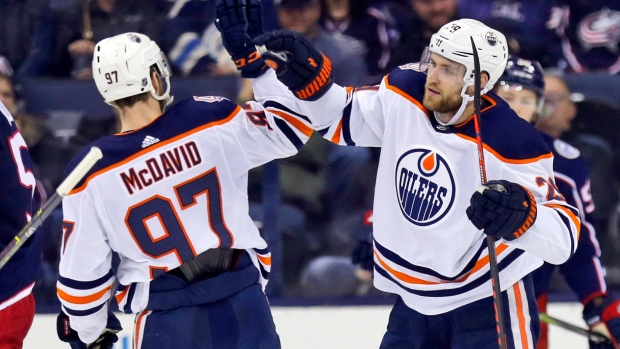Feb 6, 2020
McDavid, Draisaitl carrying an almost unprecedented offensive burden
The two Edmonton Oilers stars are making a run at the numbers put up by Alex Ovechkin during his astounding 2007-08 season, Travis Yost writes.
By Travis Yost

Alexander Ovechkin put together one of the most absurd years of the modern era during the 2007-08 NHL season, finishing with a mind-bending 65 goals and 47 assists (112 points) – a scoring rate so significant he ended up winning the Art Ross Trophy, the Hart Memorial Trophy, the Lester B. Pearson Award, the Rocket Richard Trophy, and was named to the league’s first All-Star Team.
The season was not a particularly memorable one in Washington, though. Despite one of the best seasons in recorded history from a single player, Washington finished just third in the Eastern Conference and was shockingly eliminated by Philadelphia in the first round. It wasn’t because of Ovechkin. He had four goals and five assists in the series, comfortably leading the team in scoring. Even more absurd: Ovechkin was on the ice for 60 per cent of the goals scored by the Capitals in the series.
Washington was heavily reliant on Ovechkin’s scoring – or his presence on the ice opening up shooting lanes for players like Viktor Kozlov, Sergei Fedorov, Nicklas Backstrom and Alexander Semin. When he wasn’t on the ice, the offence simply fell apart.
If Ovechkin being on the ice for 60 per cent of the goals in that first-round series seems impossible to believe, consider the fact that it was lower than his regular season average. In 2007-08, Ovechkin was on the ice for 38 per cent of available ice time and a whopping 63 per cent of Washington’s goals. The latter number has really only been challenged a handful of times since, and some of those challenges were by Ovechkin in other seasons (like, 2008-09).
That brings me to this year’s Edmonton Oilers. The team is demonstrably better than what the standings reflected a season ago, and yet they are largely the same team – heavily reliant on their top line to score and their goaltending to make saves. When it’s clicking, they look playoff-calibre. When it’s not, you get this sort of game.
This story has been written a thousand times over about the Oilers in the Connor McDavid era, but for the first time in a long time, I’m starting to think that one (or both) of Edmonton’s stars could eclipse that Ovechkin number. If you sample every regular forward since the 2007-08 season, you see just how close they are to dethroning Ovechkin.
Heavy usage, even heavier offensive burden. The common theme you have for all of these forwards is that they were absolute superstars in their respective windows who also happened to play on teams with very little supporting cast in the offensive zone.
That becomes obvious when you consider the rate scoring splits with and without a given player on the ice. Consider Ovechkin’s infamous 2007-08 season against the likes of McDavid and Leon Draisaitl this year and it’s hard not to notice that these teams – all of which had very skewed scoring rates – didn’t offer much when it came to the postseason, and that’s assuming they even made it in the first place.
I will subset this data to even strength in order to make a true apples-to-apples comparison:
If you can believe it, Ovechkin’s situation in Washington that year was actually more top-heavy than what we are seeing in Edmonton right now. His team scored at a pitifully low rate, but it was also an unstoppable force in the minutes he was out there.
I don’t think it’s a secret that Oilers GM Ken Holland is going to be hunting for assistance both at the trade deadline and this summer, even with a challenging cap situation. This type of scoring burden is obviously unsustainable and, at least historically speaking, it hasn’t been a recipe for success either.
But give credit to the Oilers this season, even if that credit is disproportionately allocated to a couple of players – winning matters, and they are in good position to snatch a playoff berth after last season’s disappointing ending.

